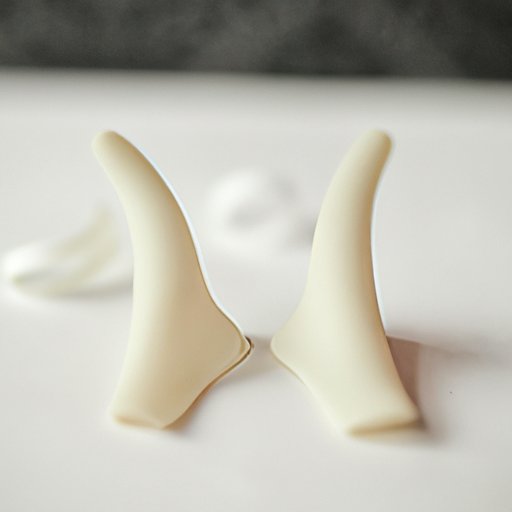
Introduction
Nosebleeds, also known as epistaxis, may seem like a minor inconvenience, but they can be quite alarming. They can happen at the most unexpected times and can sometimes be difficult to stop. Knowing how to stop a nosebleed is important for anyone who experiences them on a regular basis or for those who want to be prepared in case of emergencies. This article explores various ways to stop nosebleeds quickly and effectively, such as immediate actions, effective home remedies, dietary changes, and alternative medicines.
Understanding the Causes of Nosebleeds
Nosebleeds happen when blood vessels in the nose become damaged or irritated. Some common causes of nosebleeds include:
Dry air
Living in a dry, climate-controlled environment can dry out the lining of the nose, making it more susceptible to nosebleeds.
Injury
Nose injuries, such as getting hit in the face or nose picking, can cause nosebleeds.
High blood pressure
Hypertension or high blood pressure can weaken blood vessels, increasing the risk of nosebleeds.
Certain medications
Anticoagulant medications such as aspirin, warfarin, and clopidogrel can interfere with the way blood clots, making nosebleeds more likely.
Immediate Actions to Stop Nosebleeds
In most cases, nosebleeds can be stopped with self-care measures at home. Here are some immediate actions you can take to stop a nosebleed:
Pinching the nose
Sit up straight and lean forward slightly before pinching your nostrils together for ten to fifteen minutes. This helps to put pressure on the blood vessels and stem the blood flow.
Applying ice
Apply a cold compress or ice wrapped in a towel to the bridge of your nose. This helps to constrict the blood vessels and slow down the bleeding.
Keeping the head elevated
Keeping your head elevated above your heart can help stop nosebleeds. This can be done by sitting up straight or using a pillow to prop up your head.
When to seek medical attention
You may need to seek medical attention if the nosebleed is severe, lasts for more than twenty minutes, or if it is caused by an injury to the head. You should also contact a doctor if you experience frequent nosebleeds that do not respond to self-care measures at home.
Effective Home Remedies to Prevent Nosebleeds
In addition to immediate actions, you can take preventive measures to reduce your risk of nosebleeds. Here are some effective home remedies for stopping nosebleeds:
Using a humidifier
Using a humidifier or vaporizer can help keep the air in your home moist, which prevents the drying out of nasal membranes.
Drinking plenty of water
Staying hydrated is important to keep the body and nasal membranes well-hydrated and functioning properly.
Avoiding nose-picking
Trauma to the inside of the nose, such as nose-picking, can cause nosebleeds. Avoid picking at your nose or blowing your nose with force.
Keeping the nose moisturized
Applying a nasal saline spray or petroleum jelly to the inside of the nostrils can help keep the nasal membranes moist and reduce irritation.
Dietary Changes to Prevent Nosebleeds
Some dietary changes can also help prevent nosebleeds. Here are some foods that can help:
Foods rich in vitamin K and iron
Maintaining a diet rich in vitamin K and iron can help blood clot and strengthen capillary walls. Some vitamin K-rich foods include leafy greens, broccoli, and asparagus, while iron-rich foods include liver, lean red meat, and dark leafy greens.
Improving blood flow and clotting
Foods that can improve blood flow and clotting include garlic, turmeric, and onions. These foods can help increase blood circulation and improve the body’s natural clotting ability.
Alternative Medicines for Treating Nosebleeds
If you prefer natural remedies, here are some alternative medicines you may try:
Herbal supplements
Herbal supplements such as bilberry, butcher’s broom, and grapeseed extract may help strengthen blood vessels and decrease inflammation, which can reduce your risk of nosebleeds.
Essential oils
Essential oils such as lavender, cypress, and frankincense may help reduce inflammation and promote healing due to their antiseptic and anti-inflammatory properties. You can either add a few drops to a diffuser or mix them with a carrier oil and apply to the inside of the nose.
When to Seek Medical Attention
In some cases, nosebleeds may require medical attention. Seek medical attention if you experience:
Severe blood loss
If you experience severe blood loss or have other symptoms such as lightheadedness, shortness of breath, or chest pain, seek medical attention immediately.
Frequent nosebleeds
If you experience frequent nosebleeds that do not respond to self-care measures, you should contact your doctor. They may need to perform a medical exam to determine the underlying cause of the nosebleeds.
What to expect during a doctor’s visit
Your doctor may perform a physical examination to determine the cause of your nosebleed. They may also perform blood tests, imaging studies, or refer you to an ear, nose, and throat specialist (ENT) for further evaluation.
Conclusion
In conclusion, nosebleeds can happen to anyone, but they are usually not a cause for concern. Knowing how to stop a nosebleed is important, and this article has outlined the various immediate actions and effective home remedies you can use to manage nosebleeds. By taking preventive measures, such as dietary changes and alternative medicines, you can reduce your risk of nosebleeds and promote overall health. If you experience frequent nosebleeds that do not respond to self-care measures at home, contact your doctor for further evaluation.





